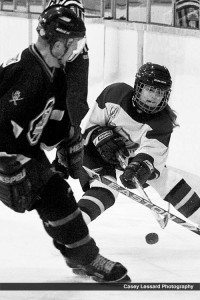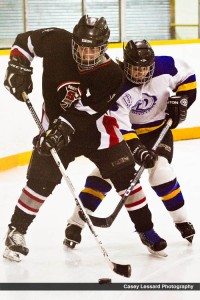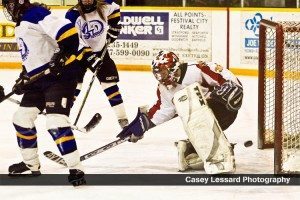 Jolene Unwin of Crediton died October 9, 2007 after the car she was driving rolled on the gravel road near her home. She was a month shy of her 20th birthday. To remember Jolene, Jim and Donna Unwin organize an annual hockey game involving family, friends and the London Devilettes, a team she was about to start playing hockey with before her death.
Jolene Unwin of Crediton died October 9, 2007 after the car she was driving rolled on the gravel road near her home. She was a month shy of her 20th birthday. To remember Jolene, Jim and Donna Unwin organize an annual hockey game involving family, friends and the London Devilettes, a team she was about to start playing hockey with before her death.
This year’s game was held March 27 at the South Huron Recreation Centre in Exeter. Funds raised this year go to the Critical Care Unit at the London Health Sciences Centre, where Jolene spent her last moments.
As told to Casey Lessard
Game photos by Casey Lessard
Donna: She was almost born on Friday the 13th. She would stay up late at night, wouldn’t go to bed even when she was a baby. She’d be up in the morning at six o’clock when Jim would go to work. She just never wanted to miss anything.
Before she played hockey, she was a member of the Exeter Starlights Baton for two or three years, and she also played baseball. When she was in Grade 8, that summer she said, “I’m going to play hockey next year and I’m going to be a goalie.” Sure enough, they didn’t have one, so that’s when she started playing hockey and went into net.
Jim: I coached her for three years. I liked to see her play hockey because she always played road hockey out here with the boys, and she was the goalie. I tried to get her to use her glove hand a lot. I’d fire tennis balls at her all the time. The first year she played goal, she was voted to go to the all-star game.
Donna: With the hockey, because of her size, the first time she was skating around against Parkhill, the girls commented that the net was taller than the goalie. But she surprised them all.
As she was going through school, she was an artist right from the start. She was always drawing stuff or making stuff. She made her own doll outfits. As she got older, I don’t think she ever went anywhere without her sketchpad. That’s why we’ve got all these pictures here. If she got depressed, she would draw a picture and that would help her out.
 Finding her way
Finding her way
Donna: She had just got her license in June, just before she started her course at Fanshawe College. She had taken a year off school and was here all the time. When we were away, she did a lot of cutting grass and taking care of the house. She’d help the boys with their homework if they needed it. It was weird to have her out of the house.
Jim: I didn’t want her moving to London, but it was nice for her to move on.
Donna: And she moved in with friends, two of them her best friends. It wasn’t like she was going off to be with people she didn’t know.
She came home on Thanksgiving Saturday and picked up Jacob to bring him up to Kincardine, to our place up there. My mom and dad, and aunt and uncle were there and we had Thanksgiving there. Jacob had a project, so she brought him home on Sunday and took him into town to a friend’s place.
For some reason, she came back here rather than going straight back to London. She lost control of the car on the gravel road. It was freshly laid gravel. They had just done it the past week. When Jacob come home from where he was doing his homework, that’s when we found out about it.
As soon as the police called us, all they said was we had to get to London. The hospital called and said we had to get there right away. They wouldn’t say anything about her condition. The police told us they don’t condone speeding, but we should get there as fast as we could. You have a feeling when they say that, that there’s something terribly wrong.
Jim drove and I was calling everyone so my mind wasn’t dwelling on what was going on. When we got to the hospital and they told us, it was very, very hard.
They were asking us to do organ donations. We decided to do that, and at about 11:30, they tested her and her brain was still alive, so they kept her on life support. Then at about three o’clock, she had no blood pressure and I heard one of the nurses in back say that if that keeps up, the organs won’t be any good. So we decided then to shut the machine off and there was no use to put her through any more. It was hard to do.
We turned the machine off and watched her pass away. I spent a little time with her and we came home. One of the longest days of our lives.
Jim: It still hurts. I go talk to her every day at the cemetery in Crediton. Every day.
Donna: We still struggle with it, even now. It’s going to take us a long time to get over it.
You just go a day at a time. That’s why we do this game to keep her memory going. Her friends have been a good support. I don’t really remember a lot of it because you go through on autopilot. It gets a little easier, but not much. There’s always things you know you’re not going to be able to do.
I don’t think she would want us to dwell on it. She would want us to get over it. But that’s not the way things are. I know she wouldn’t want us to be upset about it all the time. But it’s not that easy.
This year’s game raised about $6,000 for the LHSC Critical Care Unit. Jim would like to see the game grow to include a match with former NHL players. In addition to this fundraiser, Jim’s employer donates money for a scholarship in Jolene’s memory to help students interested in art or sports who need financial assistance to attend school.


